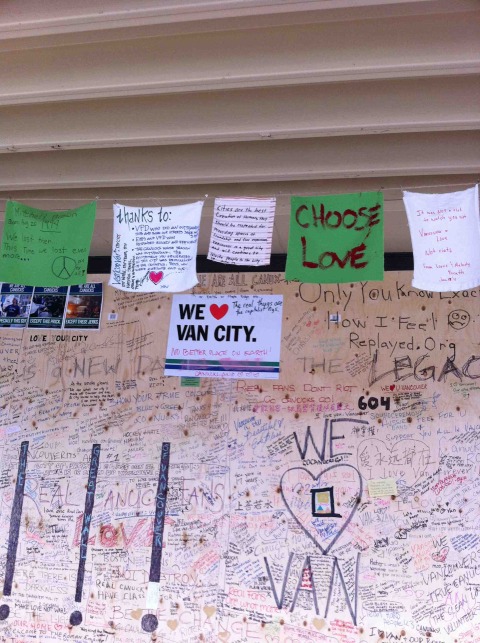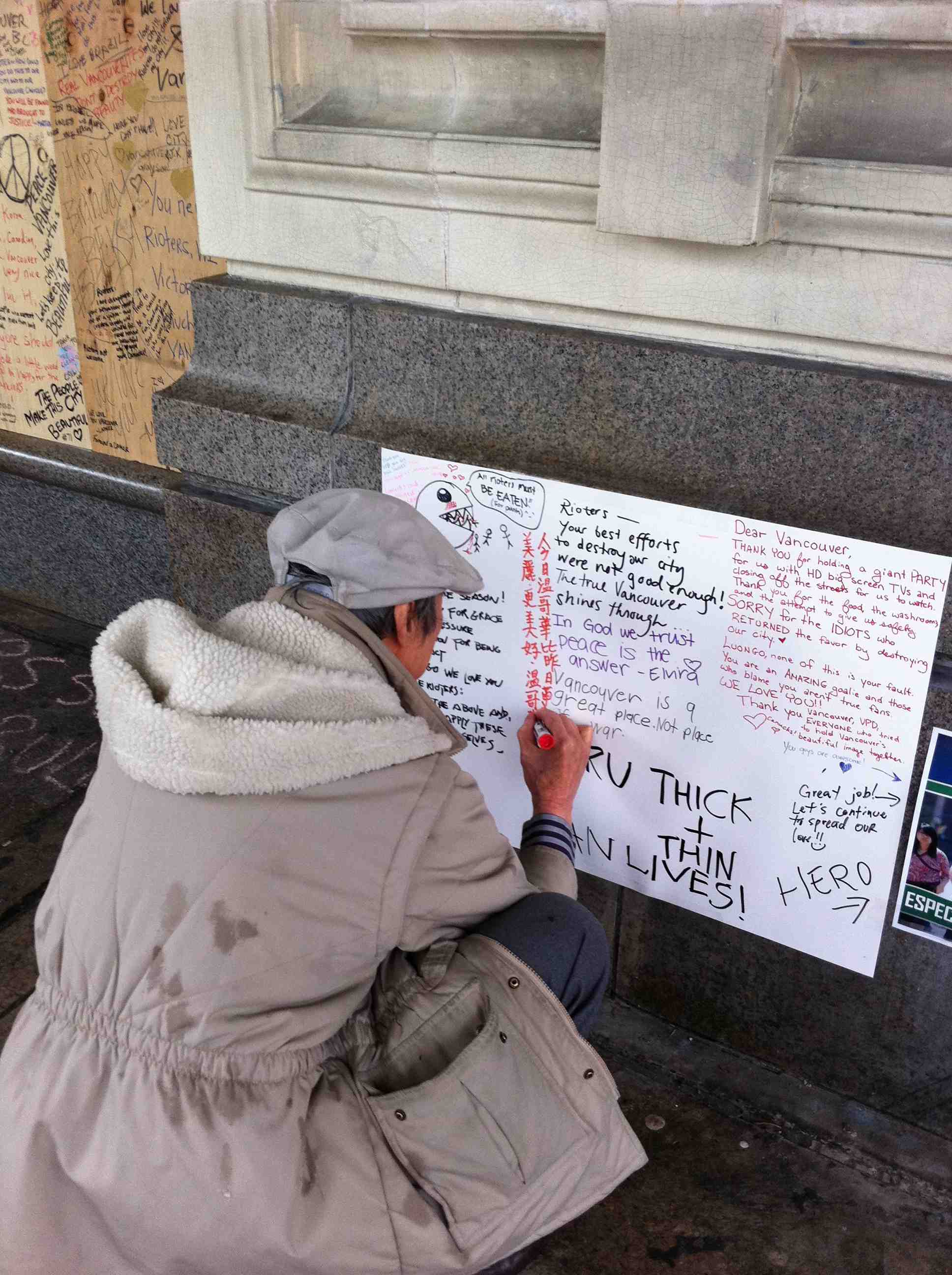Vancouver’s Streets
 Monday, June 20, 2011 at 6:16PM
Monday, June 20, 2011 at 6:16PM This is an age of conflict and paranoia brought on to some degree by 9/11 and the wars of the last ten years, but also by a breakdown in our definitions of civility and shared norms. I base this assertion on my own reading of contemporary culture through the artifacts that are being produced and via the social response to those artifacts.
The Vancouver riots of June 15th are just the tip of the iceberg. At a recent showing of films by Emily Carr University students in animation and film/video, I watched many films of chases, violence and just plain paranoia. Creative students are the canaries in the mine. They are pointing towards something much more profound, centred on a breakdown in some core beliefs about democracy, change and the general impact that individuals can have on the social contexts they share.

The Real Vancouver: Graffitti on Walls of the Bay in Downtown Vancouver
Part of the problem is rooted in a shift in the ways in which politicians in Western democracies exercise their rather precious mandate. In Canada, fewer and fewer people in the 20-40 age group vote. I spend a great deal of time talking to students in my job, and the general response to this evacuation of personal and public responsibility is based on the belief that their voices don’t actually count. This loss of voice does not mean they have nothing to say. Rather, they don’t believe their opinions are understood and have no real sense that their viewpoints will be respected and acted upon. This is an issues that our elected representatives need to be sensitive to and act upon.
Yet, with social media at their disposal, this age group are able to share their beliefs, argue about their differences and often come to some sense of common purpose within the networks they build. However, translating all of that discussion into action is a major step and not one that is easy or made easier by the conventional feedback processes we have in our society. And, remember, most of what social media provide are discourse based relationships; words and sometimes images are the mediators that both screen and define relationships within networked worlds.
The Vancouver riots, for all of their sheer stupidity and senseless violence, are an eruption of the real, an explosion of energy because so much of what our mediated cultural spaces create are shared convictions as well as fictions, but reality does not follow a straight line. It certainly has no clear beginning, middle and end. It is unfortunate that violence was seen to be a solution to this conundrum by those who perpetrated it.
A fAceBook (this is not a typo…but a way of pointing out the contradictions of the term) conversation is not a real conversation, it is somewhere in between real and distant, mediated and connected. Exchanges on Twitter are not equivalent to intense conversations over a cup of coffee between two people gazing at each other’s eyes and intensely watching each other’s body movements. Viewing a hockey game cannot make your favourite players better or even winners. Screaming does not improve the game. Fantasizing about victory is just that, a fantasy.

A collective of 100,000 people assembled to exercise their will to win a hockey game. They projected so much of who they were onto the screens that mediated their experiences of the game, that failure and loss cracked the glass windows separating them from controlling the outcome. They then turned on each other and with each act of violence confirmed their need to feel in control of the reality they were in.
The issue is not whether a minority or majority of people got involved in breaking down the norms that govern our everyday lives. The issue is that some sort of violence is ever present in our society, represented at its apogee by the constant threats we have been living with since 9/11. And remember, it is not only the threats from terrorists but also the threats of environmental catastrophe, depletion of food sources and the crumbling financial and physical infrastructure of Western economies.
Notwithstanding the many thousands of people who turned up to clean the Vancouver we all love, the riots of the 15th of June must be examined for their deeper origins otherwise we will lose the opportunity to solve their root causes.
 Fantasy,
Fantasy,  History,
History,  Vancouver Riots,
Vancouver Riots,  Violence in
Violence in  Community
Community 


Reader Comments (3)
Hello Ron
I thought I'd share this history with you from my UBC days when Jerry Rubin presented the pig candidate for the 1968 American Presidential election:
http://www.library.ubc.ca/archives/facclub/facclub5.html. (1968)
http://www.publicaffairs.ubc.ca/ubcreports/2007/07dec06/invasion.html (2007)
Thank you for your thoughtful comments. They stir a few questions and comments that I will, mostly likely poorly, try to articulate. First, I think the perceived lack of political agency is only recently true, albeit, in a small way, up until just after the last election, parties were funded according to votes. I would like to mention this fact because so many people didn't know, and I wish I had known earlier also. That may have been just enough to keep me from voting strategically, which I find positions me defeated from the start. Secondly, I am interested in how you experienced the riots, were you down there? Because from my view, and perhaps this does not quite fit with your point, it seemed that the fans knew quite early on that the game would be a loss for the Canucks, and it appeared that once the game was over, the "fans/rioters" had to work quite hard to get themselves worked up enough to enact that kind of violence. That leaves me asking: What can we do to create/find agency? So far, I haven't seen any suggestions circulating.
We need more carnivals. We need more density. We need more public spaces. We need better urban planning. We need more collaboration and less solo production. We need more street vendors and less bureaucrats. We need more daily chaos and less control over everything. We need more small businesses and more social justice. We need less fear and more travel. We need less blogging and more cafes. We need more artist squats. We need more graffiti. We need more arguments and less politeness. We need more carnivals, more festivals, more actors and less spectators.
Maybe we need more performing arts at Emily Carr?